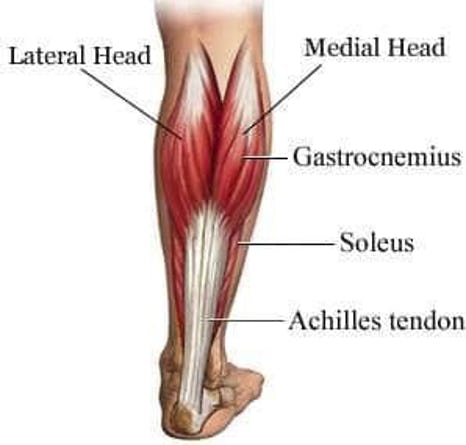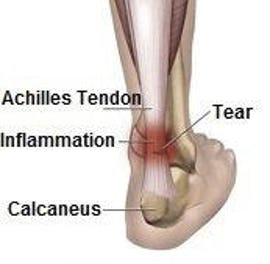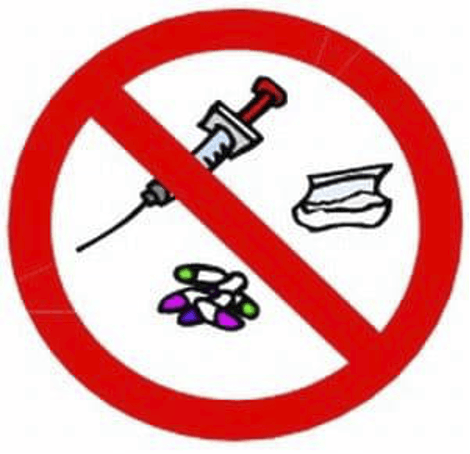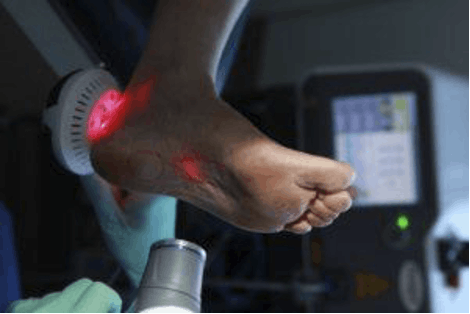Your Achilles tendon has an important job. It is the strongest tendon in your body. It helps you point your foot down, rise up on your toes and push off when you walk or run. The Achilles tendon, also called the calcaneal tendon, is a band of fibrous tissue at the lower end of the calf. It connects the calf muscles to the heel bone. But this powerful tendon is also subject to painful injury.

What is Achilles Tendonitis?
Tendonitis, (also called tendinitis) is the inflammation of a tendon. The part of the tendon known as the watershed zone contains the weakest blood supply. Watershed zones are particularly vulnerable to inflammation and possibly rupture.
Insertional Achilles tendonitis affects the lower part of the heel, where the tendon is attached. Noninsertional Achilles tendonitis refers to fibers in the middle portion of the tendon which have broken down, swollen and thickened.
Anyone can injure their Achilles tendon, but it is most common in active individuals. Injuries to the Achilles tendon can result in a difficulty walking, climbing stairs, or participating in other recreational activities. Factors often lead to an injury include:
- Extreme training (particularly running on hills.)
- A change in an athlete’s training, such as increased intensity, or a change in playing surface.
- Excessive pronation, (rolling inward on the foot) or ankle instability (rolling of the ankle.)
- Chronic ankle instability, or a recurrent “giving way” or rolling of the ankle
- High heels may shorten the Achilles tendon, making it more prone to injury
- High-arched feet
- Some forms of arthritis
- Aging, which reduces the blood supply to tendons.
Bursitis and tendonitis are common types of soft tissue inflammation. These conditions frequently occur in the ankles, knees, elbows, hips, or wrists. Fluid-filled sacs called bursae help bone, muscle, and tendons work smoothly together. Inflammation of one of these sacs is called bursitis. Tendons connect muscles to bones and inflammation of a tendon is called tendonitis. In some cases, the tendon can partially or completely tear.

Do You Have Achilles Tendonitis?
If you think you may have injured your Achilles tendon, you can try this simple home test. While lying on your stomach, squeeze your calf muscle. If the tendon is still connected, the foot should point. If you are still experiencing discomfort or mobility problems, you should consult your doctor for a thorough physical examination.
If you do have an injury, your doctor may recommend a combination of treatments. These may include:
- Rest, which may mean anything from limiting workouts to complete rest for a period of days or weeks.
- Elevating the foot, to minimize swelling.
- Ice packs, which reduce pain and inflammation.
- Compression bandages and orthotic devices. For those with insertional Achilles tendonitis, heel lifts may be helpful.
- Nonsteroidal anti-inflammatory drugs, such as ibuprofen, help reduce pain and swelling.
- Steroid injections may reduce swelling, but also has potential risks.

Depending on the severity of the tendonitis, healing generally takes anywhere from a few days to six weeks.
In the case of tendon rupture, your doctor may recommend surgery. This is often performed in an outpatient setting and typically takes an hour or less. The patient is usually able to return to full activity by six months after surgery, although full recovery may take at least a year.
For Achilles tendonitis, physical therapy can relieve your pain. It can allow you to regain your strength and function so that you can gradually return to your normal activities. Physical therapy treatments often include:

Strengthening exercises to help you build up weakened muscles and protect you from another injury.
- Stretching and flexibility exercises. These help prevent your tendon from shortening.
- Exercises to improve coordination and endurance.
- Massage, to increase circulation and flexibility.
- Ultrasound heat therapy, which promotes healing.
- Class IV Cold Laser Light Therapy
For more information about Achilles tendonitis, contact Hess Physical Therapy via phone or visit our website www.hesspt.com for further contact info. We will work with you and your doctor to create a physical therapy plan for your recovery.
Our locations:
- Kennedy: (412)-771-1055
- Crafton: (412)-458-3445
- Allison Park: (412)-487-2787
- Bethel Park: (412) 835-2626
- Atlasburg: (724) 947-9999
Website: www.hesspt.com
Disclaimer: this information is "not medical advice" and is used at the site visitor's own risk.
